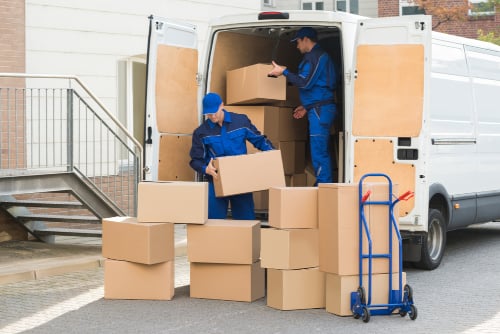
If you are planning to relocate to Thailand, you may wish to ship your belongings and furniture, especially if the costs are being covered by your company. In this case, it is worth enquiring with your company about relocation recommendations, as they may have other expat employees who have been through the process and can give advice.

International movers
When choosing an international relocation company, it is worth choosing one with a long track record, one that is a member of the FIDI Global Alliance and accredited by the FAIM quality standard, which is the only quality standard for overseas relocation.
Large moving companies will offer a door-to-door sea freight service, which offers the choice of having your goods loaded at your door to your own designated shipping container or sharing space inside a container that would be loaded at a depot.
The number of things you wish to move will determine the service you require, as well as the costs involved. Firstly, it is a good idea to get a free home survey from a company to find out whether your move will require the use of your own sea freight container or if your charges can be based on the volume that you decide to ship. If you are simply looking to send a small consignment of up to 20 suitcases/cartons/bags, then you may just require a quote for excess baggage shipping or an airfreight service instead.
What you should ship, sell, donate, or trash
First-timers to Thailand might not know what to send to the country when they move here. Do you really have to ship all your furniture? What about electronics like TVs, irons, microwaves, and vacuums? These are all valid concerns that you should consider. After all, it might be cheaper to buy the items again in Thailand than ship them to the other side of the world.
You should ship family heirlooms or other items of sentimental value. You should ship high-quality furniture. You can also ship personal hobby items like bicycles, crafting equipment, books, and so on. These all tend to be more expensive in Thailand.
Because Thailand runs on 220 volts, none of your 110-volt appliances or electronics (if you come from a country that uses these) will work in Thailand. You should sell or donate them before you leave. If you really must bring them with you, you can buy a 2,000-watt, 220-volt to 110-volt converter in Bangkok's Chinatown for about THB 2,000.
Other than that, you will be able to find clothes, sporting goods, children's gear, and much more all throughout Thailand.
Prohibited objects in Thailand
Certain things are not allowed to be brought into Thailand. These include narcotic drugs, live animals, firearms and ammunitions, radio transmitters, seeds, plants, dried floral arrangements, medicinal products, firearms and ammunition, explosives and fireworks, narcotics, pornography, and medical equipment. You may also require approval to ship certain restricted exports, such as wine and spirits, Asian antiques, or religious artifacts and food.
If you wish to ship your furniture and belongings to Thailand, you will need to show your passport, proof of a non-immigrant visa, and work permit, which are both valid for at least a year. You will also need to complete a relocation inventory form, which the relocation company should help you prepare, and a valuation form for shipment protection cover.
The moving process in Thailand
After your pre-move survey has been completed, you will be assigned move coordinators who will control all aspects of your relocation from start to finish. If you wish to change items on your relocation list before moving day, then you should discuss changes with the person managing the process.
Most companies appreciate at least 4 weeks' notice prior to the relocation date. However, some companies do understand if you are unable to give this much notice and offer a provisional booking process where the crew can be allocated on a provisional moving date.
Many foreigners moving to Thailand don't manage to find their accommodation before they move. However, this shouldn't be a problem for a professional relocation company as many will simply require a contact address and contact details when you initially book the move. The delivery address can then be advised later or after your arrival.
Once your goods have gone through customs clearance in Thailand, you can arrange a suitable delivery date or request for your belongings to be kept in storage until you have found a place to call home in Thailand.
On your relocation date, experienced export packing teams can come to your home to professionally pack the contents that you wish to be shipped to Thailand using the correct packing materials. All items should be packed into export-approved cartons, and all furniture should be protected using export-approved blankets. Once packing is complete, the crew will create an inventory listing all the items.
On the other hand, you can pack all your household items yourself into boxes while keeping inventory of the items and the number of boxes. Then, you can measure how much square footage the boxes take up, give that number to the relocation company, and they can quote you a shipping price.
Whether you are sending a full or part-load container, it should be secured with a customs-type seal before shipping, and you should be given the estimated time of arrival of your container. The time between relocation from your home and arrival at your new residence in Thailand varies depending on the shipment size and origin country. Still, it is often approximately 5 to 8 weeks for full-container shipments from Europe and 6 to 10 weeks for part-load shipments.
An experienced international relocation company will be able to handle any customs clearance formalities on your behalf to ensure that your goods are cleared correctly. The clearance process will begin once your personal and household effects arrive in Thailand and are presented to customs for approval. This process can take up to 7 days or sometimes even longer, but you can expect to be kept updated. It is important to note that you will need to pay duty on certain items, such as wedding gifts, brand-new furniture, wine, and food, for your shipment to be released.
Relocation insurance and fees in Thailand
If you choose to go with a company that offers a door-to-door service, then the fees will include customs clearance and other related charges, which should be listed in the initial quote. If you are a first-time immigrant to Thailand, you will be allowed free entry of duty on one sea freight and one airfreight shipment of household goods that are more than 6 months old. To be eligible for this free entry, you must not import your goods any earlier than 1 month prior to your arrival and no later than 6 months after your arrival in Thailand.
Shipping your goods if your spouse is a Thai national
Many expats move to Thailand from abroad with their Thai spouses. In this case, the relocation process works a little differently because one person is a Thai national. This means you can ship all of your household items – old or new – without having to pay any import fees.
Your Thai spouse just has to show proof of Thai citizenship to the relocation company, and the relocation company will handle the rest.
Good to know:
Before you ship your goods, you will need to complete a Shipment Protection Valuation Form, which details the items you would like to cover and their values. It is important to make sure you are precise in this list so as to be protected from any loss or damage to your property.
Useful links:
We do our best to provide accurate and up to date information. However, if you have noticed any inaccuracies in this article, please let us know in the comments section below.








